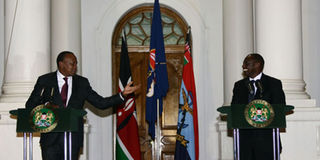Uhuru set to name Principal Secretaries

President Kenyatta (left) and Deputy President William Ruto at State House, Nairobi April 24, 2013 when they named Cabinet Secretary nominees. The two are expected to to release the list of Principal Secretary nominees June 7, 2013. FILE
President Kenyatta and his Deputy William Ruto are expected to release the list of Principal Secretary nominees Friday.
The two will name the PSs in the 18 ministries during a function at State House, Nairobi at 4pm.
The President is expected to name 23 principal secretaries from a shortlist of 66 nominees sent to him by the Public Service Commission (PSC).
It is highly likely that some PSs from the former regime could be retained.
Article 155 (1-3) of the Constitution says: “There is established the office of Principal Secretary, which is an office in the public service. Each State department shall be under the administration of a Principal Secretary.”
"The President shall nominate a person for appointment as Principal Secretary from among persons recommended by the Public Service Commission; and with the approval of the National Assembly, appoint Principal Secretaries.
It furthers in 4 and 5: “The President may re-assign a Principal Secretary and he or she may resign from office by giving notice, in writing, to the President.
On Tuesday, President Kenyatta was given the green light to nominate principal secretaries after a case challenging the short-listing of candidates was dismissed.
Justice Isaac Lenaola ruled that the petition by the Consumers Federation of Kenya was speculative and a premature invocation of the Constitution.
The judge said there was nothing wrong in the short-listing and interviewing by the Public Service Commission and that their job, according to the law was to recommend names to the President.
“The role of the commission is only one in a chain of events,” Justice Lenaola ruled.
The consumer’s lobby had argued that the commission conducted interviews in violation of the Constitution by refusing to consider public participation.
They argued that the decision to “secretly” recommend to the President names of successful candidates was unconstitutional.




